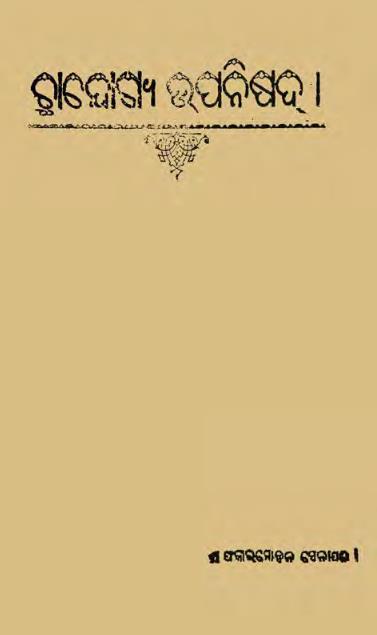Fakir Mohan Senapati, a pioneering figure in Odia literature, made a significant impact with his work, Chhandogya Upanishad, published in 1916. This masterpiece not only highlights his poetic prowess but also reflects the depth of philosophical thought embedded in the Upanishadic texts, a collection of ancient Indian scriptures that explore the nature of reality, consciousness, and the self.
Senapati’s appreciation for the rich heritage of Odia culture is evident in his endeavor to bring the essence of the Upanishads to the vernacular. By translating and adapting these ancient philosophies into Odia poetry, he made complex ideas accessible to the common people. The Chhandogya Upanishad, specifically, delves into the profound notions of the ‘Brahman’ (the ultimate reality) and the ‘Atman’ (the individual self), exploring their interconnectedness and the journey towards self-realization.
The beauty of Senapati’s poetry lies not only in his linguistic dexterity but also in his ability to weave narratives that resonate with the Odia psyche. His verses are imbued with spirituality, mysticism, and the rich tapestry of legends that are integral to the Odia cultural milieu. While engaging with the sacred texts, he draws upon folklore and local traditions, illustrating how universal truths can find their expression within the specificities of regional narratives, thus fostering a deep emotional connection with his audience.
One of the striking features of Senapati’s Chhandogya Upanishad is his use of sub-poetry, where he crafts smaller poetic forms that encapsulate larger themes and ideas. Each poem serves as a meditative reflection on concepts such as enlightenment, the pursuit of knowledge, and the essence of life itself. In doing so, he not only pays homage to the original text but also reinterprets it in a manner that is relevant to contemporary Odia society. This approach allows readers to engage with the text on multiple levels, encouraging a dialogue between ancient wisdom and modern sensibilities.
Legend plays a crucial role in Senapati’s work, as he often draws from mythological references to illustrate philosophical points. Through the invocation of legendary figures and stories, he deepens the reader’s understanding of the metaphysical concepts discussed in the Upanishads. These legends serve as allegories, allowing for a richer exploration of themes such as sacrifice, devotion, and the nature of existence. They remind readers that the journey towards self-discovery is multifaceted, requiring both introspection and an appreciation of the world around them.
Books Info
| Books name | Chhandogya Upanisad / ଛାନ୍ଦୋଗ୍ୟ ଉପନିଷଦ |
| Author | Fakir Mohan Senapati |
| No Of pages | 133 |
| Publisher | NA |
| Publication | 1916 |
| Printed At | V.Kar |
| Distributor | NA |

